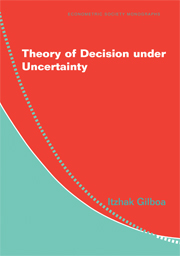Book contents
- Frontmatter
- Contents
- Preface
- I Intuitive Definitions
- II Behavioral Definitions
- 6 A Case Study
- 7 The Role of Theories
- 8 Von Neumann–Morgenstern's Theorem
- 9 De Finetti's Theorem
- 10 Savage's Theorem
- 11 The Definition of States
- 12 A Critique of Savage
- 13 Objectivity and Rationality
- 14 Anscombe–Aumann's Theorem
- III Alternative Behavioral Theories
- IV Cognitive Origins
- References
- Index
- Titles in the series
13 - Objectivity and Rationality
Published online by Cambridge University Press: 05 January 2013
- Frontmatter
- Contents
- Preface
- I Intuitive Definitions
- II Behavioral Definitions
- 6 A Case Study
- 7 The Role of Theories
- 8 Von Neumann–Morgenstern's Theorem
- 9 De Finetti's Theorem
- 10 Savage's Theorem
- 11 The Definition of States
- 12 A Critique of Savage
- 13 Objectivity and Rationality
- 14 Anscombe–Aumann's Theorem
- III Alternative Behavioral Theories
- IV Cognitive Origins
- References
- Index
- Titles in the series
Summary
There is no fundamental reason for this chapter to come at this point in the discussion. However, if we haven't discussed these issues yet, it might be a good idea to do it now, after Savage's theorem was discussed, and before we look for alternative approaches.
SUBJECTIVITY AND OBJECTIVITY
When subjective probability was introduced, and even when it was championed by de Finetti, people tended to believe that certain things have existence that is objective and unrelated to the observer, that is, to us. On this background, de Finetti said, “Probability does not exist,” meaning that it is not an objective feature of the world around us, but only a concept that is in our minds, something that we impose on reality around us, trying to make sense of our observations.
Since then many things happened, and reality is not what it used to be. Many people think that objective reality does not exist, that the most we can refer to is intersubjectivity, and so forth.
Personally, because of my inability to understand ontology, I never quite understood what can be “objective” in the classical sense. I was therefore excited to read the definition of objective probabilities in Anscombe and Aumann (1963). They argue that all probabilities are subjective, but if subjective probabilities happen to coincide, we call them objective.
- Type
- Chapter
- Information
- Theory of Decision under Uncertainty , pp. 138 - 141Publisher: Cambridge University PressPrint publication year: 2009



